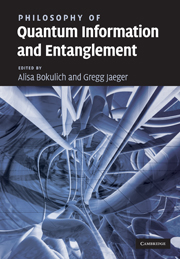Book contents
- Frontmatter
- Contents
- List of contributors
- Preface
- Introduction
- Part I Quantum entanglement and non-locality
- Part II Quantum probability
- Part III Quantum information
- 8 Schumacher information and the philosophy of physics
- 9 From physics to information theory and back
- 10 Information, immaterialism, instrumentalism: Old and new in quantum information
- Part IV Quantum communication and computing
- Index
10 - Information, immaterialism, instrumentalism: Old and new in quantum information
from Part III - Quantum information
Published online by Cambridge University Press: 04 August 2010
- Frontmatter
- Contents
- List of contributors
- Preface
- Introduction
- Part I Quantum entanglement and non-locality
- Part II Quantum probability
- Part III Quantum information
- 8 Schumacher information and the philosophy of physics
- 9 From physics to information theory and back
- 10 Information, immaterialism, instrumentalism: Old and new in quantum information
- Part IV Quantum communication and computing
- Index
Summary
We live, we are told, in an information age. We are told this, perhaps, less often than once we were; but no doubt only because the phrase has become worn from use. If ours is an age of information, then quantum information theory is a field propitiously in tune with the spirit of the times: a rich and sophisticated physical theory that seeks to tame quantum mysteries (no less!) and turn them to ingenious computational and communication ends. It is a theory that hints, moreover, at the possibility of finally rendering the quantum unmysterious; or at least this is a conclusion that many have been tempted to draw.
Yet, for all its timeliness, some of the most intriguing of the prospects that quantum information science presents are to be found intertwining with some surprisingly old and familiar philosophical themes. These themes are immaterialism and instrumentalism; and in this chapter we shall be exploring how these old ideas feature in the context of two of the most tantalizing new questions that have arisen with the advent of this field. Does quantum information theory finally help us to resolve the conceptual conundrums of quantum mechanics? And does the theory indicate a new way of thinking about the world – one in which the material as the fundamental subject matter of physical theory is seen to be replaced by the immaterial: information?
- Type
- Chapter
- Information
- Philosophy of Quantum Information and Entanglement , pp. 208 - 228Publisher: Cambridge University PressPrint publication year: 2010
- 8
- Cited by

